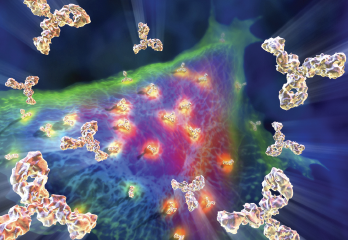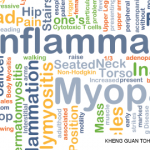
Hybrid Medical Animation / Science Source
A study published in Arthritis & Rheumatology highlights how the presence of autoantibodies to peptidylarginine deiminase (PAD) may eventually be used to influence treatment decisions in the management of rheumatoid arthritis (RA), sharpening our understanding of disease subtypes.1 Although follow-up prospective studies are needed, these findings underline some intriguing areas for future investigations in immunobiology.
PAD Background
The PADs are a family of five related isozymes that catalyze the post-translational citrullination of histones, fibrinogen and other proteins. Erika Darrah, PhD, assistant professor of medicine in the division of rheumatology at Johns Hopkins School of Medicine, Baltimore, is first author of the recent Arthritis & Rheumatology paper, “Association of Baseline Peptidylarginine Deiminase 4 Autoantibodies with Favorable Response to Treatment Escalation in Rheumatoid Arthritis.” She explains that PAD2 and PAD4 are both expressed at relatively high levels in the joints of RA patients, and they seem to be the isozymes most relevant to the disease.
Dr. Darrah notes both are produced by inflammatory cells, particularly white blood cells. She adds, “PAD4 is pretty much restricted to those cell types, but PAD2 is expressed at many sites all over the body.”2
This process of extracellular citrullination sometimes leads to multiple isotypes of autoantibodies to citrullinated antigens, termed anti-citrullinated protein antibodies (ACPAs, which are detected via the cyclic citrullinated peptide [CCP] assay). Although citrullination seems to play an important role in many inflammatory processes, the presence of ACPAs is highly specific for RA. ACPAs also indicate a more severe disease course is likely and more aggressive management may be required.3
Polyclonal antibodies can also develop to the different PAD isoforms themselves, e.g., PAD4 autoantibodies. “PAD4 antibodies are strongly associated with ACPAs and tend to be found in a subset of patients with ACPAs,” Dr. Darrah explains. “If we look just within the CCP-positive individuals, it’s a little less than 50% that will also have antibodies to PAD4.” PAD4 antibodies are found in around 30–35% of the total RA population, making it less sensitive than the standard diagnostic tests for RA: CCP and rheumatoid factor.2
PAD4 antibodies are found at higher rates in patients with more long-standing disease, and they do not appear as often in the preclinical phase of disease compared with a marker such as CCP.2 Several cohort studies have shown PAD4 antibodies are associated with severe erosive disease in patients receiving the standard of care.4-6 However, other evidence suggests that in patients who are also CCP positive, PAD4 autoantibodies are associated with delayed disease onset.7

